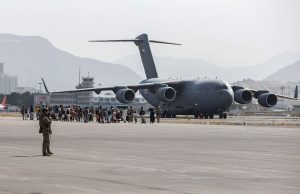The US faces yet another Afghan dilemma
The US faces an ethical and political conundrum in the coming year with tens of thousands of Afghans evacuated to the US when their nation fell to the Taliban facing possible deportation.
Without congressional action, the Afghans may be sent home as their temporary humanitarian visas expire.
In August, 2021, as the Afghan government collapsed, the Biden administration authorised the use of ‘humanitarian parole’ to fast track the entry of Afghans into the US.
Many of the 80,000 or so evacuees had worked with, or for, the US Government and its allies for years.
It is now not clear whether Republican congressmen and women, who will shortly hold a majority in the House of Representatives, will support a new bill to formalise the status of Afghan evacuees in the US.
Although humanitarian parole, which lasts for two years, accelerated their processing, the program didn’t provide settlement services or a path to long-term residency for the new arrivals.
 The Afghans have been living with uncertain futures and they will soon be subject to deportation unless Congress acts by adjusting their status.
The Afghans have been living with uncertain futures and they will soon be subject to deportation unless Congress acts by adjusting their status.
The Afghan Adjustment Act – a bipartisan piece of legislation introduced in – is aimed doing that but it is struggling to pass.
The bill may become caught up in wedge politics with the Republicans eager to weaponise the debacle of the Afghan withdrawal.
They have hinted at plans to hold hearings on the subject in the next Congress, in an attempt to frame the Biden administration’s efforts in Afghanistan as disastrous.
It’s difficult to imagine Republicans taking a high moral stance on the US’ involvement in Afghanistan while also deporting Afghans
But Republican support for the Afghan Adjustment Act appears to be patchy
Outside of Congress the bill’s biggest supporters are veterans.
Chief amongst them is With Honor Action, a non-profit group that supports the For Country Caucus, a bipartisan coalition of military-veteran legislators in the House.
Its co-founder is Rye Barcott, a Marine Corps veteran, who believes the Afghan Adjustment Act is likely to be blocked by both parties.
“Political polarization contributes to and drives our amnesia. Congress can’t get out of its own way. There’s no special interest here, and so there’s no one who has this as their top legislative priority,” he said in a recent interview.
“The adults in the room all realise this is the right thing to do, but it’s not getting done. This is going to be the next betrayal, not only for the Afghans, but also for those who served alongside them.”
“People can’t imagine that we’re going to take all these Afghans, who we evacuated at great risk and expense, and put them on planes back to Afghanistan. But if Congress doesn’t act, that’s exactly what could happen,” Mr Barcott said.












